In this blog we’ll be exploring the most effective tools for measuring the success of your digital marketing. In today’s fast-paced digital landscape, understanding the impact of your marketing efforts is crucial to stay ahead of the competition.
From tracking website traffic and analysing social media engagement to monitoring conversion rates and customer behaviour, the right set of measurement tools can provide invaluable insights.
Join us as we unveil the best tools available, empowering you to unlock the true potential of your digital marketing campaigns and make data-driven decisions to achieve unparalleled success.
What is a marketing tool?
A marketing tool can be defined as any strategy, software, platform, or technique that helps businesses promote their products, services, or brand to reach and engage with their target audience effectively.
These tools are used to execute, track, and analyse marketing campaigns, with the ultimate goal of attracting new customers, retaining existing ones, and driving business growth.
Marketing tools can encompass a wide range of functionalities and applications, including but not limited to:
- Social Media Management Platforms: Tools that help manage and schedule social media posts, monitor mentions, analyse engagement, and track performance on various social media platforms.
- Email Marketing Software: Platforms that facilitate the creation and distribution of email campaigns, allowing businesses to send targeted messages and newsletters to their subscribers.
- Content Management Systems (CMS): Software that enables easy creation, management, and publication of digital content on websites and blogs.
- Customer Relationship Management (CRM) Software: Platforms that help businesses organise and track customer interactions, manage leads, and improve customer relationships.
- Search Engine Optimization (SEO) Tools: Software that assists in optimising websites to improve their search engine rankings and increase organic traffic.
- Analytics and Reporting Tools: Tools that provide valuable insights and data on marketing performance, website traffic, audience demographics, and more.
- Advertising Platforms: Platforms that allow businesses to run paid online advertising campaigns, such as Google Ads, Facebook Ads, and other display ad networks.
- Marketing Automation Software: Tools that automate repetitive marketing tasks, such as email sequences, lead nurturing, and social media posting.
- Video Marketing Software: Tools designed to create, edit, and distribute video content for marketing purposes.
These are just some examples, but ultimately the choice of marketing tools depends on your businesses specific goals, target audience, and budget or overall strategy.
7 Best Tools for Measuring Digital Marketing Success:
When it comes to measuring digital marketing success, several tools stand out for their ability to provide comprehensive insights and analytics. The marketing tools listed in this blog can help you facilitate your everyday responsibilities as a marketing professional.
Here are 7 of the best marketing tools we think are worth considering:
We wouldn’t be very good marketers if we didn’t promote our own tools first…
1. Website Grader
Give your website a well needed free online health check!
LOCALiQ’s Website Grader is a digital marketing tool designed to assess and evaluate the performance of a website in terms of its online presence, search engine optimisation (SEO), user experience, and overall digital marketing effectiveness.
It helps businesses and marketers measure their digital marketing success by providing a comprehensive analysis of their website’s strengths and areas for improvement.
This tool takes an in-depth look at your website, social media accounts, local business listings and more to give you an overall digital score so you can identify actionable areas for improvement and achieve great results.
LOCALiQ’s Website Grader is a valuable tool for businesses and marketers to assess their website’s digital marketing readiness and effectiveness. By using this tool and acting on its insights, businesses can optimise their websites, improve user experience, enhance SEO, and ultimately drive better results and success in their digital marketing initiatives.
Here’s how LOCALiQ’s Website Grader serves as a valuable tool for measuring digital marketing success:
- Website Performance Evaluation: Website Grader examines various performance aspects of a website, such as page load speed, mobile responsiveness, and overall site health.
- SEO Analysis: This tool assesses the website’s SEO elements, including meta tags, keywords, and backlinks. It checks for SEO best practices and identifies areas where SEO improvements can be made.
- Traffic and Conversion Analysis: The tool may also provide insights into the website’s traffic sources, user behaviour, and conversion rates. Understanding how visitors interact with the site helps in measuring the effectiveness of digital marketing strategies in driving traffic and converting leads..
- User Experience (UX) Assessment: The Website Grader evaluates the website’s usability and user experience. A positive user experience leads to higher engagement, longer visit durations, and increased chances of conversion, all of which contribute to digital marketing success.
- Mobile-Friendliness Check: With the increasing use of mobile devices, a website’s mobile-friendliness is critical. The tool assesses whether the website is optimised for mobile devices, which can significantly impact search rankings and user satisfaction.
Actionable Recommendations: Based on the analysis, the Website Grader provides actionable recommendations and tips for improving the website’s performance and digital marketing strategies. Implementing these recommendations can lead to better overall success in online marketing efforts.
How much does it cost to have your website graded?
Nothing, it’s completely free!
Click here to download your free report today.
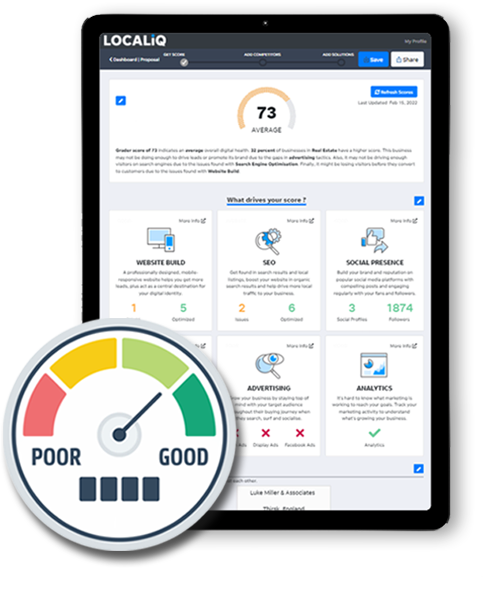
2. Client Centre
LOCALiQ’s proprietary technology, Client Centre, is the all-in-one marketing analytics tool for making cost-effective advertising decisions for your business. Whether it is a PPC, SEO or paid social campaign, this smart-tracking technology analyses the routes customers take to discover your business – providing you with the insights to achieve the maximum ROI for your budget.
Our marketing analytics software helps you to feel safe with your investments, view real-time reports and instant results and listen to phone calls from prospective clients.
Several exciting features include:
- Real-time reporting
Enjoy on-demand, instant reporting with LOCALiQ’s exclusive tool. Analyse your campaigns, the number of conversions and new customers. Manage your marketing activity via phone, tablet & desktop – so you miss no opportunities
- Single lead dashboard to view all aspects of your marketing
Client Centre is your all-in-one marketing hub for managing leads and analysing activity via our easy-to-use lead dashboard. View, manage and engage with your leads via your Client Centre dashboard
- Comprehensive and easy-to-use reporting
Leave no stone unturned – assess previous campaigns to understand their routes to success and discover potential areas for improvement. Generate better results for your business with our powerful insights
- Call tracking and recording
Get transparency into how your teams handle calls, the info your customers want, and how to convert more callers into customers. We make it easy to build better customer relationships.
Want to see it in action? Watch our latest video and discover how our exclusive reporting and analytics technology can help your business. Or, get in touch to arrange your free marketing consultation.
3. Google Analytics
A staple in the digital marketing world, Google Analytics offers robust tracking and reporting features. It provides valuable data on website traffic, user behaviour, conversion rates, and much more. With customisable dashboards and goal tracking, it enables marketers to measure the effectiveness of their campaigns and make data-driven decisions.
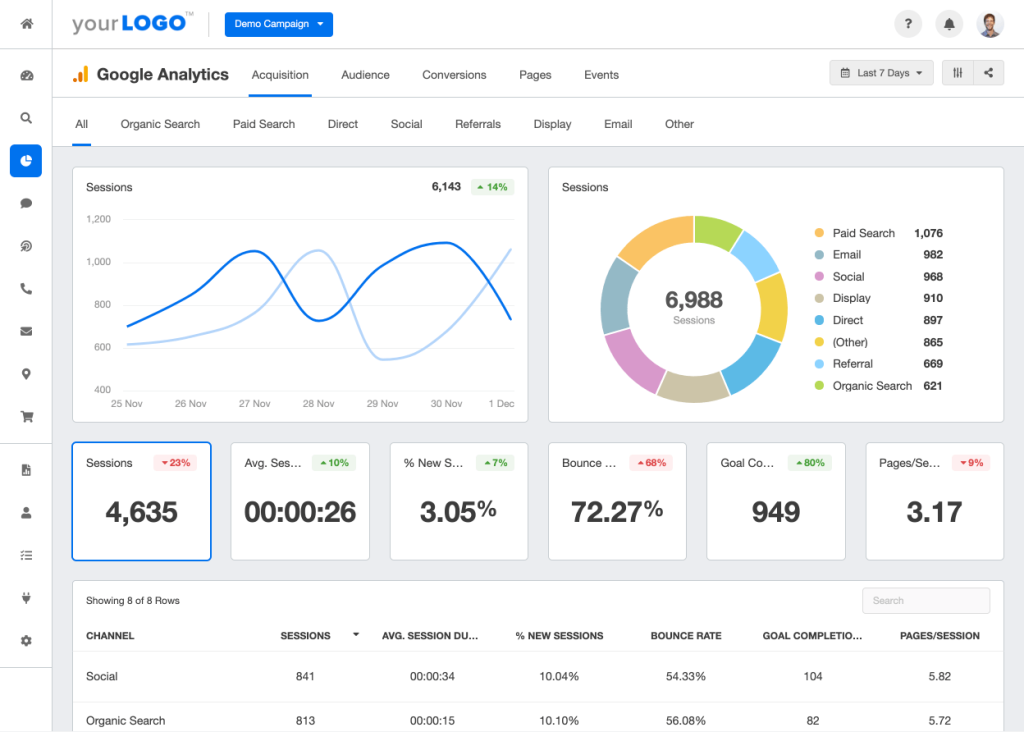
Here’s are some of the key features Google Analytics serves as a powerful tool for measuring success in digital marketing:
- Website Traffic Analysis: Google Analytics tracks the number of visitors to your website, the sources of traffic (organic search, direct, social media, etc.), and the pages they visit
- Audience Demographics and Behaviour: You can gain insights into your website’s audience, including their age, gender, location, interests, and devices used, helping you to tailor your marketing messages and content to better meet their needs
- Goal Tracking: Google Analytics allows you to set up and track specific goals, such as form submissions, newsletter sign-ups, or product purchases. By monitoring goal completions, you can assess the effectiveness of your digital marketing campaigns.
- E-commerce Tracking: If you run an online store, Google Analytics provides e-commerce tracking, enabling you to monitor sales, revenue, and product performance. This data helps you identify your most popular products and areas for improvement in your sales process
- Behaviour Flow: Google Analytics’ Behavior Flow report shows how visitors move from one page to another and where they drop off. This visual information helps you identify pages with high exit rates and areas for website improvement
- Campaign Tracking: With UTM parameters, Google Analytics can track the performance of specific marketing campaigns. You can see which campaigns are driving the most traffic and conversions, allowing you to allocate resources more effectively
- Real-Time Analytics: Google Analytics offers real-time data, giving you instant insights into the current performance of your website. This is particularly useful for monitoring the impact of time-sensitive campaigns and promotions
- Site Search Analysis: If your website has a search feature, Google Analytics can track what users are searching for. This information can help you understand user intent and optimise your content based on popular search queries
- Mobile Analytics: As mobile usage continues to grow, Google Analytics provides mobile-specific data, allowing you to understand how users interact with your website on different devices.
Want to learn more about Google Analytics? Discover the fundamentals of Google Analytics 4 with LOCALiQ’s complete guide, or you can learn how to make the most of GA4 and how to use it to drive business growth with LOCALiQ’s free on-demand webinar.
Mastering Google Analytics 4: Your Questions Answered
Discover how to make the most of GA4 and how to use it to drive business growth with our on-demand webinar.
4. Hubspot CRM
HubSpot is a powerful Customer Relationship Management (CRM) platform that offers a comprehensive suite of tools designed to help businesses attract, engage, and delight customers.
As a CRM tool for measuring digital marketing success, HubSpot provides a centralised platform to manage customer interactions, track marketing efforts, and analyse performance data. By leveraging its integrated features and analytics capabilities, you can gain valuable insights into your marketing performance, make data-driven decisions, and continuously improve your digital marketing strategies to drive business growth.
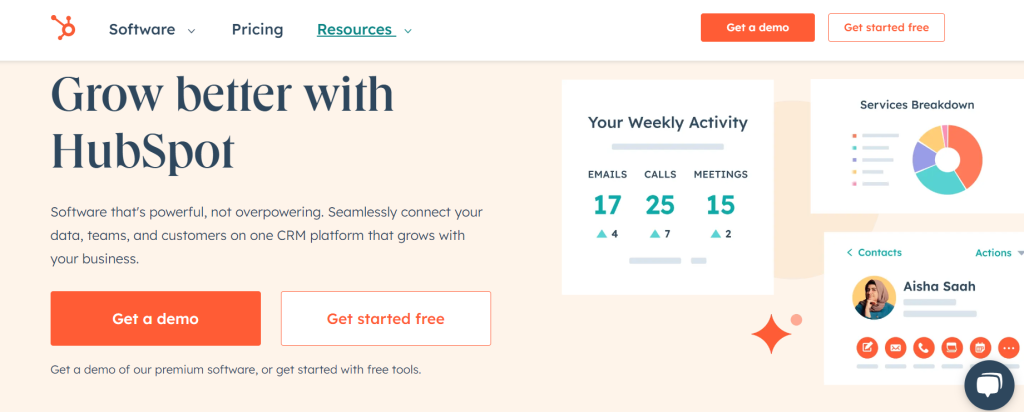
Here are some of the ways HubSpot serves as a CRM tool specifically for measuring digital marketing success:
- Contact Management: HubSpot’s CRM allows you to store and organise all your customer and lead data in one place. This includes information such as contact details, website activities, email interactions, social media engagements, and more which helps you better understand your audience and how they engage with your digital marketing campaigns
- Lead Tracking and Attribution: HubSpot tracks leads’ interactions with your marketing efforts from their first touchpoint to conversion. This attribution data allows you to identify the most effective marketing channels and adjust your strategies accordingly
- Email Marketing Metrics: Through HubSpot, you can create and track email campaigns. The platform provides data on email open rates, click-through rates, bounce rates, and more. By analysing these metrics, you can measure the effectiveness of your email marketing efforts and optimise your email campaigns for better engagement.
- Marketing Automation and Workflows: HubSpot’s marketing automation capabilities allow you to nurture leads and guide them through the buyer’s journey. Workflows can help you businesses streamline repetitive tasks, nurture leads, engage with customers, and personalise interactions based on specific triggers and conditions.
- Website Analytics: HubSpot allows you to monitor website performance as well as track the number of visitors, page views, conversion rates, and other relevant website metrics. This information helps you understand how well your website is performing as a marketing tool and identify areas for improvement.
- Social Media Monitoring: HubSpot’s CRM integrates with social media platforms, enabling you to schedule and monitor posts across different channels. The platform provides data on social media engagements, reach, and interactions so you can evaluate the impact of your social media marketing efforts and refine your content strategy.
- Campaign Reporting and Dashboards: HubSpot offers customizable reporting dashboards where you can visualise data from various marketing channels. You can track key performance indicators (KPIs), set goals, and monitor your progress towards achieving them. These dashboards provide valuable insights into the success of your digital marketing campaigns.
How much does it cost to use Hubspot CRM?
Hubspot offers 3 marketing pricing plans:
- Starter – £41 per month and includes 1,000 marketing contacts
- Professional – £207 per month and includes 5,000 marketing contacts
- Enterprise – £82 per month and includes 10,000 marketing contacts
5. SEMrush
SEMrush is a comprehensive digital marketing tool that provides a wide range of features to help businesses measure and improve their online marketing success. It offers insights and analytics across various aspects of digital marketing, including search engine optimization (SEO), pay-per-click (PPC) advertising, content marketing, social media, and competitor analysis.
SEMrush is a powerful tool for tracking search engine rankings, analysing competitors, and conducting keyword research. It provides detailed reports on organic and paid search performance, backlinks, social media engagement, and more. You can use the tool to generate content ideas and identify search intent based on the tool’s breakdown of keyword ideas, difficulty, and variations.
By using SEMrush as a digital marketing tool, businesses can gain valuable data-driven insights, identify areas for improvement, and make informed decisions to optimise their online marketing strategies, ultimately leading to greater success online.
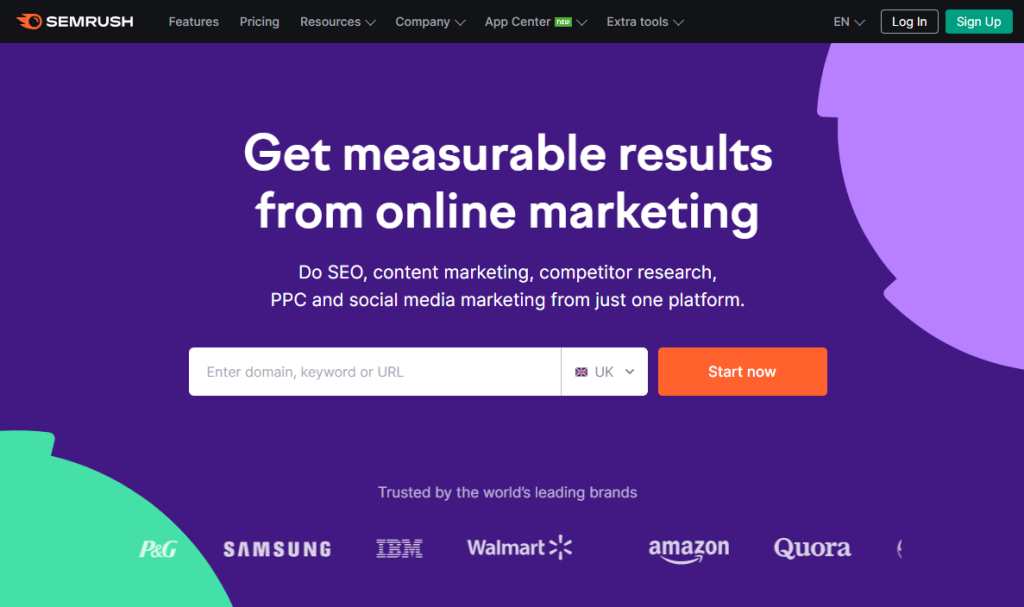
Here’s how SEMrush serves as a valuable tool for measuring success in digital marketing:
- Keyword Research and Rankings: SEMrush allows you to conduct keyword research to identify relevant and high-performing keywords for your website. It also tracks keyword rankings in search engine results pages (SERPs) over time, helping you measure the effectiveness of your SEO efforts.
- Competitor Analysis: With SEMrush, you can analyse your competitors’ online presence, traffic, and marketing strategies. Understanding your competitors’ strengths and weaknesses enables you to benchmark your performance and identify opportunities to outperform them.
- Backlink Analysis: SEMrush provides data on your website’s backlinks and those of your competitors. Monitoring your backlink profile helps you gauge the authority of your site and identify link building opportunities.
- Website Traffic Analysis: This tool offers traffic analytics that reveal the number of visitors to your website and the sources of traffic. This data helps you assess the overall performance of your website and marketing channels.
- PPC Advertising Insights: For businesses running PPC campaigns, SEMrush provides data on paid search advertising, including ad performance, keywords, and competitors’ ad strategies.
- Content Marketing Analysis: SEMrush offers content-related metrics, such as top-performing content, organic traffic to individual pages, and content gap analysis. By measuring content performance, you can identify what content resonates best with your audience and drive more traffic and engagement.
- Social Media Analytics: SEMrush provides social media analytics, allowing you to track your social media performance, engagement metrics, and compare your social media presence with competitors. This data helps you understand the impact of your social media efforts on brand awareness and audience engagement.
- Site Audit and Technical SEO Analysis: SEMrush’s site audit feature checks your website for technical SEO issues and provides recommendations for improvement. Fixing these issues can lead to better search engine rankings and overall website performance.
- Customisable Reports: SEMrush allows you to create custom reports to showcase your digital marketing performance and share insights with stakeholders. These reports can be tailored to specific metrics and KPIs that align with your business goals.
How much does it cost to use SEMrush?
SEMrush offers various pricing plans to cater to different business needs and sizes – they do also offer a 7-day free trial.
Here are some of SEMrush main subscription plans and their approximate costs:
- Pro (for newbies and small teams) – $129.95
- Guru (for agencies and mid-size businesses) – $249.95
- Business (for large agencies and enterprises) – $499.95
You can browse all of SEMrush plans and pricing here.
6. Hootsuite
Hootsuite is the leading social media management platform that helps businesses and marketers manage their social media presence, schedule posts, engage with their audience, and analyse social media performance. It provides analytics for multiple social media platforms, enabling you to track follower growth, engagement, and campaign performance.
By leveraging Hootsuite’s analytics and social media management features, businesses can gain valuable insights into their social media performance, track the impact of social media on website traffic and conversions, and make data-driven decisions to optimise their social media marketing strategies. These insights contribute to overall digital marketing success by increasing brand visibility, engagement, and conversion rates on social media platforms.
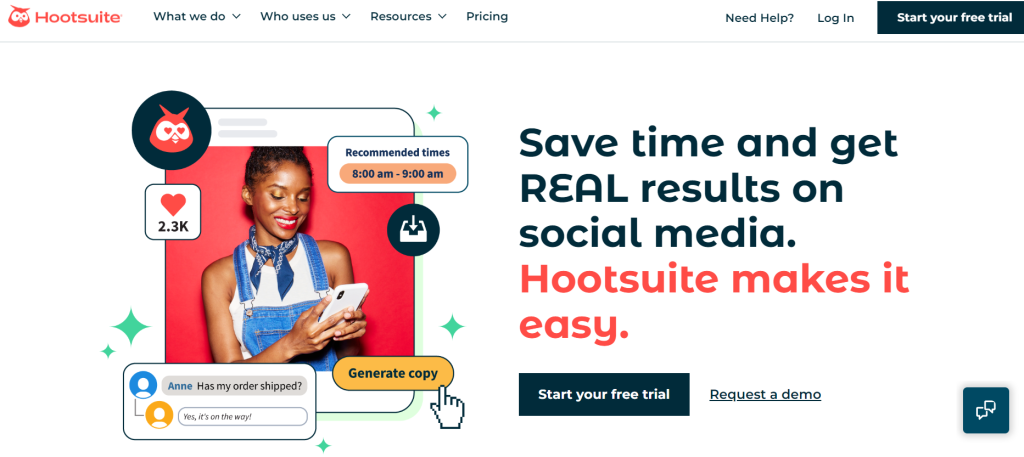
Here’s how Hootsuite serves as a tool for measuring success in digital marketing, particularly in the social media:
- Social Media Analytics: Hootsuite offers built-in social media analytics that provide insights into the performance of your social media content. You can track key metrics such as the number of followers, post reach, engagement (likes, comments, shares), and click-through rates.
- Customisable Reports: Hootsuite enables you to create customised reports that focus on specific social media metrics and KPIs. These reports can be shared with stakeholders or clients to showcase the impact of your social media efforts on overall digital marketing success.
- Social Media Listening: Monitoring social media mentions and hashtags relevant to your brand enables you to stay on top of trends, understand customer sentiment, and identify potential opportunities or issues.
- Competitor Analysis: With Hootsuite’s monitoring and listening features, you can track mentions and conversations about your brand or competitors on social media. This information provides insights into competitor performance and industry trends, allowing you to benchmark your own social media success.
- Social Media ROI Tracking: Hootsuite offers tools to help you track social media-driven website traffic and conversions. By using custom URL parameters (UTM tracking) in your social media posts, you can measure how much traffic and conversions originate from your social media campaigns.
- Engagement Metrics: Hootsuite tracks engagement metrics such as response times and response rates to messages and comments on your social media posts. Monitoring these metrics helps you gauge your brand’s responsiveness and customer engagement levels.
- Post Performance Comparison: Hootsuite allows you to compare the performance of different social media posts, helping you identify which types of content resonate best with your audience and contribute to digital marketing success.
How much does Hootsuite cost?
Hootsuite offers various pricing plans to cater to different business needs and sizes. The cost of Hootsuite depends on the plan you choose and the number of social media profiles you want to manage.
Here are some of the main Hootsuite subscription plans and their approximate costs:
- Professional Plan: This plan is suitable for individual users and small businesses. It allows you to manage up to 10 social media profiles and includes basic features. The approximate cost is £89 per month when billed annually
- Team Plan: The Team plan is designed for small to medium-sized businesses and marketing teams. It offers additional team collaboration features and can manage up to 20 social media profiles. The approximate cost is £249 per month when billed annually
- Business Plan: This plan is suitable for larger businesses and agencies with more extensive social media management needs. It supports up to 35 social media profiles and includes advanced features such as custom analytics reports and team assignments. The approximate cost is £660 per month when billed annually.
You can browse all of Hootsuites’ plans and pricing here.
7. Mailchimp
Mailchimp is a widely used email marketing platform that offers various features to help businesses create, manage, and measure the success of their email marketing campaigns. While Mailchimp is primarily known for its email marketing capabilities, it also tracks open rates, click-through rates, and subscriber behaviour, allowing you to refine your email marketing strategy.
By using Mailchimp as a digital marketing tool, businesses can measure the success of their email campaigns, understand audience engagement, and gain valuable insights into their overall marketing performance. The platform’s analytics and reporting capabilities contribute to making data-driven decisions to enhance digital marketing strategies and achieve better results.
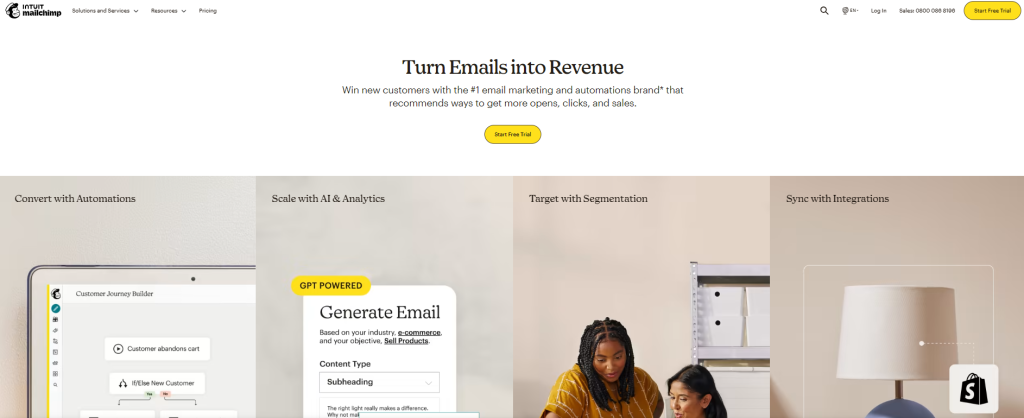
Here’s how Mailchimp serves as a tool for measuring success in digital marketing:
- Email Campaign Metrics: Mailchimp provides detailed analytics for email campaigns, including open rates, click-through rates, bounce rates, and unsubscribe rates. These metrics allow you to assess the engagement and effectiveness of your email marketing efforts.
- A/B Testing: Mailchimp enables A/B testing, where you can send variations of your email campaigns to different segments of your audience and compare their performance. This helps you optimise your email content and design for better results.
- Automation Performance: With Mailchimp’s automation features, you can set up automated email sequences based on specific triggers and conditions. The platform tracks the performance of these automated workflows, allowing you to measure their impact on lead nurturing and conversions.
- Segmentation Insights: Mailchimp’s segmentation capabilities allow you to divide your audience into targeted groups based on specific criteria. By analysing the performance of different segments, you can tailor your marketing messages for better engagement.
- E-commerce Integration: Mailchimp can be integrated with Google Analytics and other e-commerce platforms to provide a more comprehensive view of your marketing efforts.
- Social Media Post Performance: Mailchimp’s social media features allow you to schedule and track the performance of your social media posts. You can measure engagement metrics such as likes, shares, and comments to gauge the impact of your social media marketing.
- Website Tracking: Mailchimp offers website tracking capabilities that allow you to monitor website activity and measure the effectiveness of email campaigns in driving website traffic and conversions.
- Reporting and Insights: Mailchimp provides detailed reports and insights into your email and marketing performance. These reports offer actionable data to help you make informed decisions and optimize your marketing strategies.
How much does it cost?
Mailchimp offers a variety of plans depending on the number of contacts your business has. You can try the Standard or Essentials plan risk free for 1 month and switch plans or cancel any time.
Here are some of the main Hootsuite plans and their approximate monthly cost:
- Essentials: Started at £10.22 per month
- Standard: Starts at £15.73 per month
- Premium: Starts at £275.24 per month
Not sure which plan is for you? Browse all of Mailchimp plans and pricing here.
Summary
Mastering the art of digital marketing requires constant adaptation and informed decision-making. The success of your digital marketing efforts hinges on your ability to gather accurate data and extract meaningful insights. By utilising the best tools available, you can not only measure the effectiveness of your campaigns but also refine your strategies to achieve remarkable results.
Remember, digital marketing is a dynamic landscape, and staying ahead of the curve is vital to outperforming your competition. So, we recommend investing in these powerful tools, analysing your data meticulously, and letting the invaluable insights propel your business to new heights of success.
We hope you’ve found this blog helpful. At LOCALiQ we help a variety of clients across a wide range of industries with their online marketing.
If you’d like additional help with your digital marketing strategies, contact us today for a free consultation and find out how we can make your goals a reality.
Mastering Google Analytics 4: Your Questions Answered
Discover how to make the most of GA4 and how to use it to drive business growth with our on-demand webinar.








